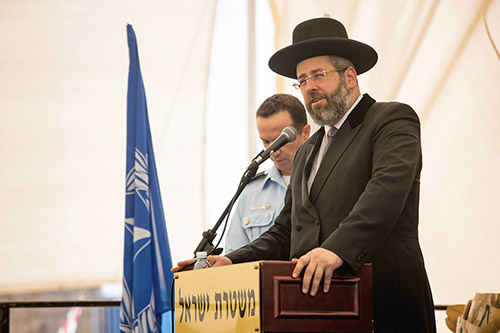

At a time of heightened tension between Diaspora Jewry and the State of Israel over religious issues, the Israeli Chief Rabbinate sought to distance itself from a controversial alleged “blacklist” of 160 Diaspora rabbis.
A letter released from the office of Israel’s Ashkenazi Chief Rabbi David Lau and publicly posted announced that the chief rabbi was “stunned” at the alleged existence of a blacklist of 160 rabbis, which included a significant number of prominent American and Canadian Orthodox leaders. These rabbis were reported as having been banned by the Chief Rabbinate from performing conversions and/or confirming the Jewish status of immigrants. However, both the list and its implications were mischaracterized, according to multiple sources.
The Jewish Link obtained a second letter, sent by Rabbi Moshe Dagan, director of the Chief Rabbinate’s office, to Rabbi Reuven Tradburks, the Rabbinical Council of America’s representative in Israel, which states the following: “The list that was released is not ‘a list of rabbis who are not recognized or authorized.’ Rather, it is a list of rabbis who received a response of ‘not recognized’ for some reason or other by the Division of Personal Status and Conversion of the Chief Rabbinate of Israel for whatever documents concerning marriage they had presented.
“I must emphasize that it is the documents or the certificates presented that are not authorized, and not the rabbis!!” Rabbi Dagan concluded.
Rabbi Mark Dratch, executive vice president of the RCA, confirmed to The Jewish Link that the chief rabbi’s office had been in touch with the RCA to relay these facts, and also clearly noted that the alleged blacklist was actually simply a list of rabbis who had had letters rejected in 2016 by the office for one reason or another.
“I am meeting with people in the chief rabbi’s office in Israel next week and as a result don’t want to make any additional public statements,” Rabbi Dratch said.
Rabbi Yehoshua Fass, co-founder of Nefesh B’Nefesh, which has assisted over 50,000 individuals in making aliyah to Israel over the past 15 years, found himself on the list, but Chief Rabbi Lau met with him on July 11 to address the issue and reject any claims of Rabbi Fass’ status. “I regret that this incident may have called your reputation into question. The Chief Rabbinate recognizes and appreciates you as a rabbi and all that you have done for the Jewish people,” Rabbi Lau told Rabbi Fass, according to a spokesman for Nefesh B’Nefesh.
After the meeting, Rabbi Fass made his own statement. “The Rabbinate should serve as a shining example of unity and connectivity within Judaism and promote its positive values in order to bridge any divides and prevent sinat chinam (baseless hatred).” He expressed his sincerest hope that this matter will be resolved immediately, and that a healing process will begin to develop between the Chief Rabbinate and rabbinic leaders across the world.
Rabbi Gil Student, editor-in-chief of TorahMusings.com and a Jewish Link contributor, added that the secular media had glommed onto this issue and turned this list into a news story. “It [the list] doesn’t say why their letters were rejected. Was it because the letter lacked a date stamp or because the signature didn’t match the letterhead or some other bureaucratic reason? No information. It’s just a list of rejections without the necessary information to draw meaningful conclusions,” he said. He added that he was not defending the Chief Rabbinate’s activities, but only clarifying the facts about this list.
The Canadian National Post, which interviewed Rabbi Adam Scheier, head of the large Shaar Hashomayim Congregation in Montreal, who was allegedly on “the list,” said that the list may in fact have no importance or relevancy in terms of determining whether rabbis are acceptable or not.
“The 160 named rabbis have each had at least one letter testifying to the authentic identity of one of their congregants rejected by the Rabbinate,” the Post noted. “Scheier, however, has no idea how many, if any, of his letters—he says he writes dozens of them every year—have been turned away.”
“One of the issues that’s lacking here is transparency,” Rabbi Scheier told the Post. “I do not know for which case my letter was rejected, if there is an individual case. I certainly have not heard of it.”
The alleged blacklist comes at a time when tempers are running higher than usual in American Reform and Conservative circles, particularly in relation to the collapse of a deal regarding a shared space for egalitarian prayer at Robinson’s Arch alongside the Kotel. Prime Minister Netanyahu last week negated the agreement, originally signed in January 2016, which had been accepted by the leaders of most major denominations of Judaism. The agreement would have expanded the prayer area at Robinson’s Arch, which is already in use, and added an entrance at the Kotel’s main pavilion. Gilad Kariv, a leader of Reform Judaism in Israel, declared in a Facebook post that the move is a submission of the Netanyahu government to the pressures of Charedi politicians.













